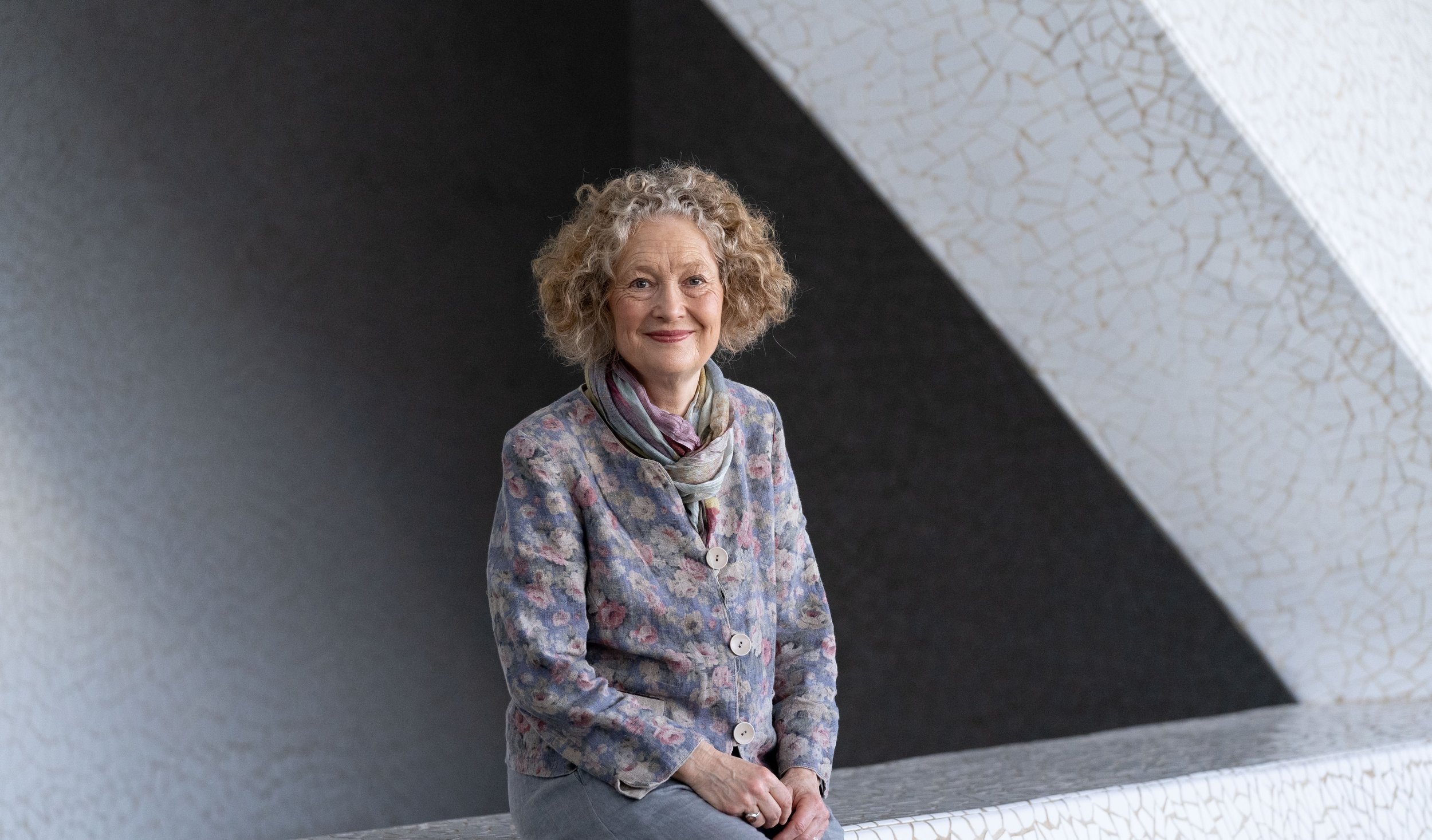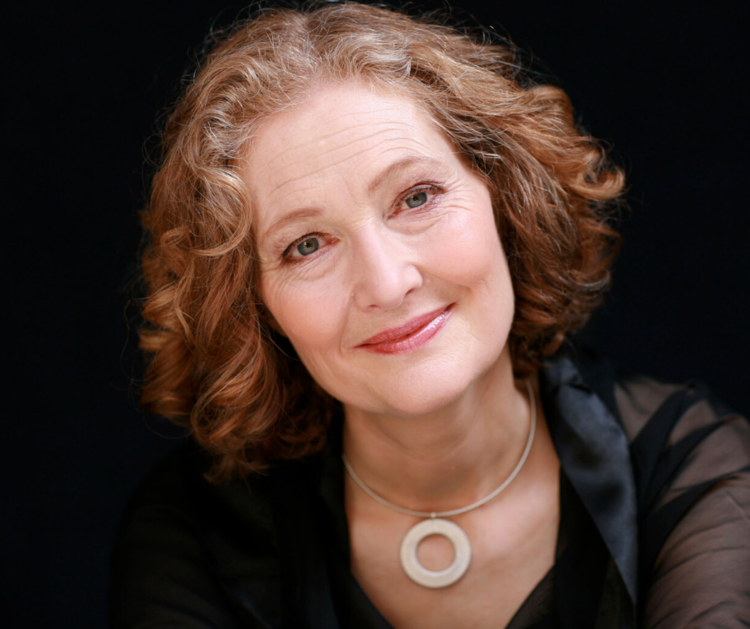
Emma Kirkby
Soprano
“Ms. Kirkby, with her pristine voice, perfect diction, and graceful phrasing, reminded us that the primary role of vocal music is to communicate.”
— Zachary Woolfe, The New York Observer
-
Originally, Emma Kirkby had no expectations of becoming a professional singer. As a classics student at Oxford and then a schoolteacher she sang for pleasure in choirs and small groups, always feeling most at home in Renaissance and Baroque repertoire. She joined the Taverner Choir in 1971 and in 1973 began her long association with the Consort of Musicke. Emma took part in the early Decca Florilegium recordings with both the Consort of Musicke and the Academy of Ancient Music, at a time when most college-trained sopranos were not seeking a sound appropriate for early instruments. She therefore had to find her own approach, with enormous help from Jessica Cash in London, and from the directors, fellow singers and instrumentalists with whom she has worked over the years.
Emma feels privileged that she built further long-term relationships with chamber groups and orchestras, in particular London Baroque, Tafelmusik, the Freiburger Barockorchester, L’Orfeo (of Linz), the Orchestra of the Age of Enlightenment, Palladian Ensemble, Florilegium, and Theatre of Early Music.
To date, she has made well over a hundred recordings of all kinds, from sequences of Hildegarde of Bingen to madrigals of the Italian and English Renaissance, cantatas and oratorios of the Baroque, and works of Mozart, Haydn and J. C. Bach. Recordings include: “Handel – Opera Arias and Overtures 2” for Hyperion, Bach wedding cantatas and Haydn “Creation” for Decca, Bach Cantatas 82a and 199 for Carus; and many projects for BIS. With London Baroque: Handel motets and arias, cantates of Montéclair, Leçons de Ténèbres of Couperin and DeLalande, Christmas music by Scarlatti, Bach and others; with the Royal Academy Baroque Orchestra the first recording of the newly-rediscovered “Gloria” by Handel; and with the Romantic Chamber group of London, “Chanson d’amour” – songs by the American composer Amy Beach, who died in 1944. “Classical Kirkby”, an anthology devised and performed with Anthony Rooley, also on the BIS label, was released in 1999; Cantatas by Cataldo Amodei, 2004; with Fretwork, consort songs by William Byrd, for Harmonia Mundi USA, 2005; Scarlatti “Stabat Mater” with Daniel Taylor, for ATMA, 2006; “Honey from the Hive”, songs of John Dowland, with Anthony Rooley, for BIS, 2006: and also for BIS two anthologies with Jakob Lindberg: “Musique and Sweet Poetrie” – lute songs from Europe, and “Orpheus in England”, music of Dowland and Purcell. Most recently BIS issued “A Pleasing melancholy”- songs with the viol consort Chelys and Jamie Akers, lute.
Despite all the recording activity, Emma has always preferred live concerts, especially the pleasure of repeating programmes with colleagues; every occasion, every venue and every audience combine to create something new from such wonderful repertoire. All through her career she has enjoyed the chance to coach interested singers in this; for close on forty years she has made regular visits to London’s Guildhall School of Music and Drama, and every summer sees her in a succession of summer schools. She was a part of Dartington International Summer School between 1977 and 2021, and has been for many years at the Sommerakademie in Neuburg-an-der-Donau, Bavaria.
More recently, she has added Oberlin, Graz, Wittenberg, Venice and Wernigerode to her regular list. In many of these places she treasures particularly the chance to share with young performers the joy of playing and singing in beautiful acoustics - those that inspired the original composers to write so idiomatically for voices.
In 1999 Emma was voted Artist of the Year by Classic FM Radio listeners; in November 2000 she received the Order of the British Empire, and in June 2007 was made a Dame Commander of the same order. In June 2008 Emma received an honorary Doctor of Music degree from Oxford University, and in 2011 received the Queen’s Medal for Music. BBC Music Magazine, in a survey of critics to find “The greatest sopranos”, placed Emma at number 10. While such things are inevitably parochial, partial, controversial, and outdated as soon as they appear, she is pleased at the recognition this implies for an approach to singing that values ensemble, clarity and stillness alongside the more usual factors of volume and display. Above all, Emma is delighted to see and hear the achievements of the current crop of young singers and players, informed, versatile, courageous, collaborative, and as powerful and expressive in consort as they are in solo roles. In such hands, the future of “historically informed performance” is assured!
-
“..here, as throughout the recital, we are given nothing less than a consummate demonstration of the art of Emma Kirkby; perfect intonation and sense of line, impeccable phrasing and diction, an unrivalled ability to nuance and color a phrase or even a word….At the outset I wrote of the autumn of Kirkby’s career. I was wrong. On the evidence of this beautifully engineered disc, it is still in high summer..” — Fanfare
“Grace was also a defining feature of Emma Kirkby’s performance. Her singing radiates lightness, clarity and precision.” — Sydney Morning Herald
“..Emma Kirkby sang these demanding works with exquisite tact. The voice is bell-like with clear articulation while her legato is absolutely unwavering. She is a true classicist. Musical structure is strictly observed through which the emotion is allowed to seep….If we could hear one of Fra Angelico’s angels singing, this is what it would sound like.” — The Age, Melbourne
“.. the singers were headed by the noted Emma Kirkby, whose small but clear English-rose soprano seems to remain perennially in bloom.” — Globe and Mail, Toronto
“Kirkby’s voice was at once hugely expressive and yet direct and unfussy, making this a performance that transcended mere entertainment and aspired to the Baroque ideal of moving the affections.”
— Irish Times
“Emma Kirkby’s bright radiance” — The Times
“Emma Kirkby - pure of voice and technically immaculate” — The Independent
“If you attend a recital by a noted singer such as Dame Emma Kirkby, a superb level of virtuosity and musicianship would be expected; what was truly amazing about her recital ‘The English Muse’ was that this expectation still did not prepare the audience for what was a stunning display of artistry and skill…In all of these songs, Dame Emma’s clarity and purity of tone coupled with a faultless diction made for utterly compelling listening; in addition, the songs were delivered with a sparkling wit and warmth clearly embedded within the music but often not convincingly delivered by other performers…And what was made very apparent last night was that Dame Emma is still at the forefront of early Music singing and rightly deserving of her international reputation as one of the world’s leading singers. — Somerset County Gazette
“Kirkby’s recital was like that small film you cherish while everyone else is whooping up the latest explosion fest. Her art is gentle and charming, and it wears its virtuosity demurely. But make no mistake, the artistry is there. Is a description needed of the voice that has graced over a hundred recordings? Suffice it to say that it was at its best Wednesday, silken and agile, chirping, wafer-thin in soft passages, vibrantly glowing in loud.”
— Los Angeles Times
“Emma Kirkby was, of course, outstanding, delicately pointing up key words and colouring the vocal line with gentle inflection and relaxed ornamention, often Italianate in style.” — Early Music Review
“She was called Emma long before everybody else was; she sang early music with That Voice before anyone else quite got the hang of it. Emma Kirkby: the great original…And the voice seems eternal. It has been most carefully nourished and nurtured; but that is not to say that Kirkby no longer takes risks. Her programme…challenged audience and performers alike…consummate command of pacing, of the breath and nerve system of both word and note, and of the finest nuances of half-voice.” — The Times
“Kirkby’s light, pure voice was ideally suited to this music and she excelled in capturing the pathos and beauty of these sad reflections. With infinite breath control, she shaped her phrases with each moment of hope and despair, and reached a pianissimo rarely achieved by singers.” — Early Music Today
“Plenty of vocalists can be emotional and sob in tune, but it takes someone special to transform the practices within their field, to command a repertory covering a thousand years of music, to excel at ensemble as well as solo performance, and to have influenced a generation of singers.” — BBC Music Magazine
“Emma Kirkby sang an aria from the Cantata 199, Mein Herze schwimmt im Blut. Her voice was centered and radiant as always.” — The Ottawa Citizen
“She did not merely perform the baroque repertoire, she inhabited it with every fragment of her body and her soul, expressing the poignant melodies with supple grace and an infinite flexibility…Every breath and every note served both the story and the song, and Emma Kirkby’s particular magic was to make it all sound effortless.”
— The Argus
"...the incomparable beauty of her singing is layered with a lifetime of nuance; every presentation provides a lesson in how these songs can be delivered." — Wholenote Magazine
“British soprano and early music icon Emma Kirkby’s performance of Italian, French and English Baroque lute songs, alongside lutenist Jakob Lindberg, was as delicate as it was detailed.”
— Sydney Morning Herald
News
Media
PURCELL “When I am Laid in Earth” from Dido and Aeneas
VIVALDI Nulla In Mundo Pax Sincera (RV 630)


